Views
The WTO TRIPS Agreement and Conflict-of-Laws Rules in Intellectual Property Cases
By Marketa Trimble, Samuel S. Lionel Professor of Intellectual Property Law, Co-Director of the IP Law Concentration, William S. Boyd School of Law, University of Nevada, Las Vegas
It is neither new nor surprising that international treaties affect the design and application of conflict-of-laws rules; not only international conventions on private international law but also other international treaties shape conflicts rules, with human rights treaties being the primary example. But a recent decision concerning the interpretation of the WTO’s Agreement on Trade-Related Aspects of Intellectual Property Rights (“TRIPS Agreement”) could have profound and arguably unprecedented effects on the conflict rules that are applied in intellectual property (“IP”) cases, such as cross-border cases concerning copyright infringement, trademark ownership, and patent licenses.
Kairos Shipping II LLC (appellant) v Songa Product and Chemical Tankers III AS (respondent), The interpretation of natural language on charter contracts
Written by Nicolás Preus Miranda, student at Universidad Carlos III in Getafe, Spain, specializing in maritime, international law and international commercial arbitration
The decision in Kairos Shipping II LLC v Songa Product and Chemical Tankers III AS [2025] EWCA Civ 1227 represents a pivotal clarification in the interpretation of repossession clauses within standard-form bareboat charterparties, particularly under the BIMCO Barecon 2001 framework. Arising from a dispute over the early termination of a charter for a 49,708 DeadWeight Tonnage (DWT) chemical/oil tanker, the case underscores the English courts’ commitment to contextual and purposive contract interpretation, balancing textual fidelity with commercial practicality. This analysis expands on the case’s significance, the interpretive principles it embodies, and its ultimate resolution, drawing from judicial reasoning and industry commentary.[1] Read more
Digital Governance, Regimes Theory and Private International Law. A tech diplomacy perspective
By Juliano Alves Pinto, Brazilian tech diplomat; former Deputy Consul of Brazil in San Francisco (2013–2016); State Undersecretary of Science, Technology, and Innovation (2019–2021); HCCH expert on digital economy (2023–2024); and Government Affairs Director at the Digital Cooperation Organization (DCO) (2024–2025)
Could Private International Law be an answer to digital governance? Though this idea has already been debated among PIL scholars, it must be said that it has not yet broken the bubble of the PIL niche. Diplomats usually overlook PIL as a small part of the larger International Law realm, which embraces Public International Law as the standard bearer of the multilateral framework that has been established ever since the Westphalia Peace in 1648. Read more
News
27th Volume of the Japanese Yearbook of Private International Law (2025)
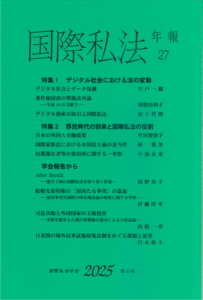
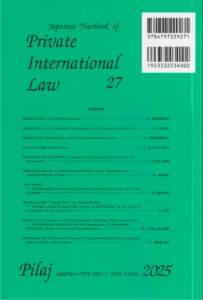
The 27th Volume (2025) of the Japanese Yearbook of Private International Law (JYPIL) (Kokusai Shiho Nenpo [Japanese]) published by the Private International Law Association of Japan (Kokusai Shiho Gakkai [Japanese]) (“PILAJ”) has recently been released.
This new volume features the following table of content.
The papers are published in Japanese; all links below direct to the papers’ English summaries.
Jiménez and Martínez on A Private International Law for Colombia
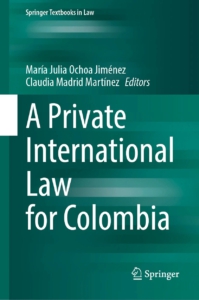
Colombian private international law research has been witnessing a notable period of renewed scholarly activity. Following a previous announcement on this blog of the publication of a volume dedicated to the Colombian Draft Project on Private International Law, a further significant contribution has now been published, this time offering a broader and more systematic perspective on the field. This new contribution takes the form of a book edited by María Julia Ochoa Jiménez (Loyola University) and Claudia Madrid Martínez (University of Antioquia), entitled “A Private International Law for Colombia”, published in the Springer Textbooks in Law series (Springer, 2025).
According to the publisher’s website, the book offers a “[c]omprehensive study of issues underlying PIL, particularly in Latin America and Colombia”, provides “[s]ystematical analysis of PIL rules in Colombia, allowing readers to understand how they deal with global issues”, and “[a]ddresses rules in force, critically examines them and, accordantly, presents and discusses a legislative proposal”. Read more
Quick and easy access to German case law in private international law – One year of ‘IPRspr 2.0’ (and almost 100 years of ‘IPRspr’)
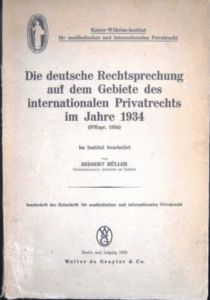
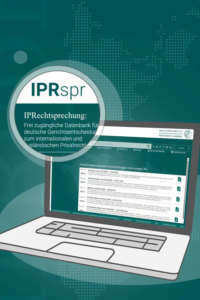
Quick and easy access to German case law in private international law – One year of ‘IPRspr 2.0’ (and almost 100 years of ‘IPRspr’)
A comprehensive and carefully curated database providing free access to German court decisions on private international law – www.iprspr.de
Ralf Michaels/Jan Peter Schmidt


